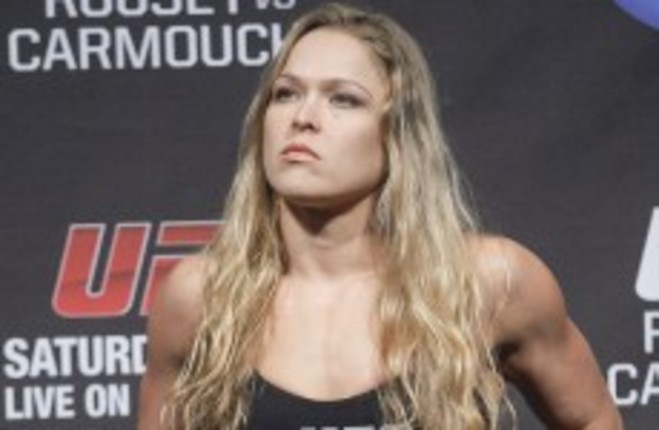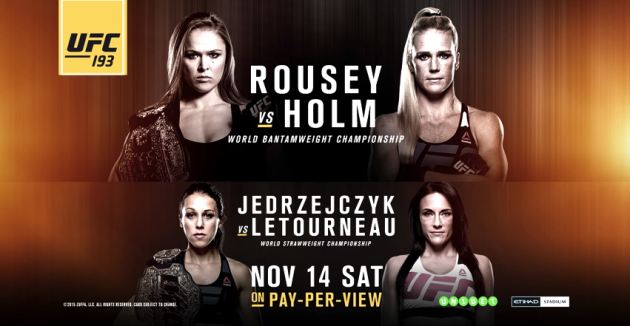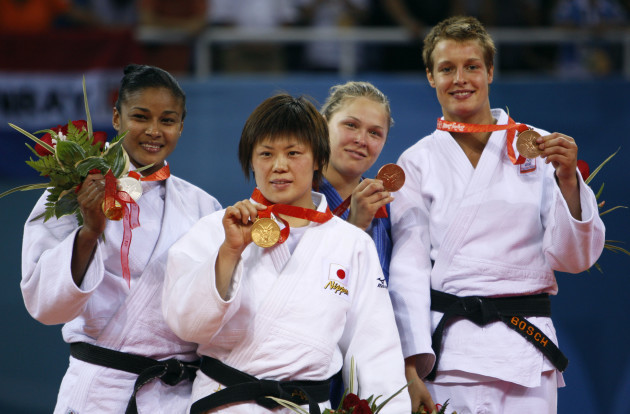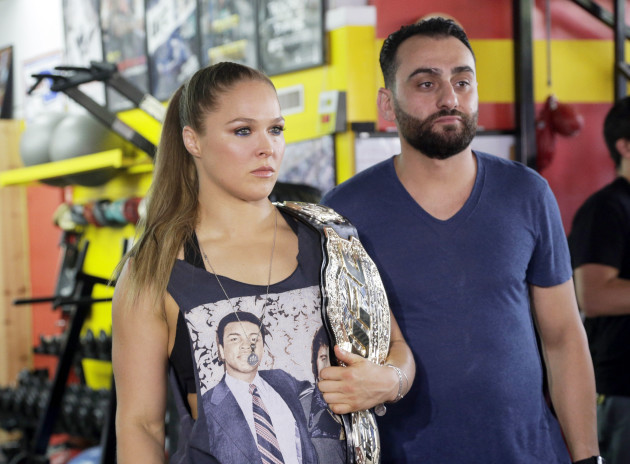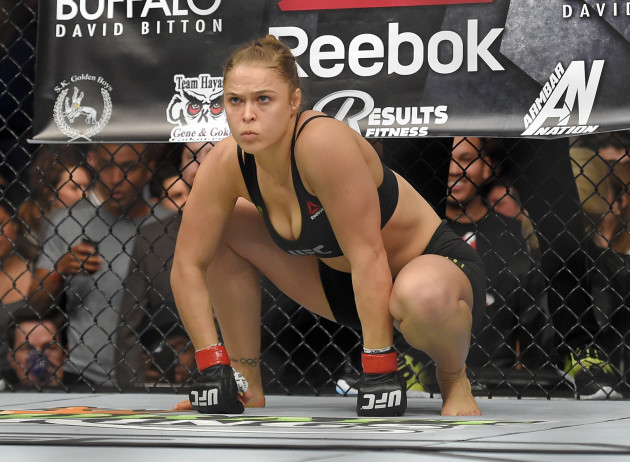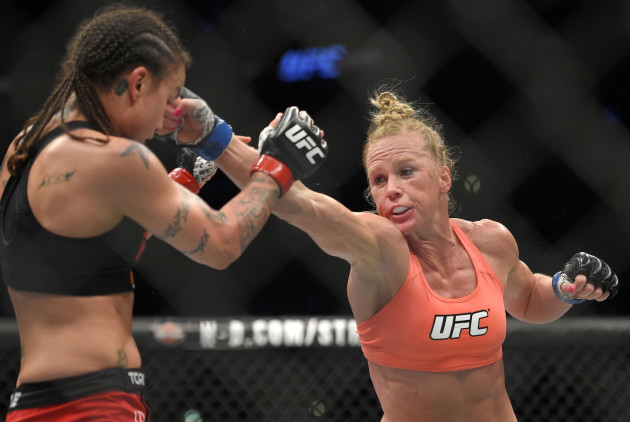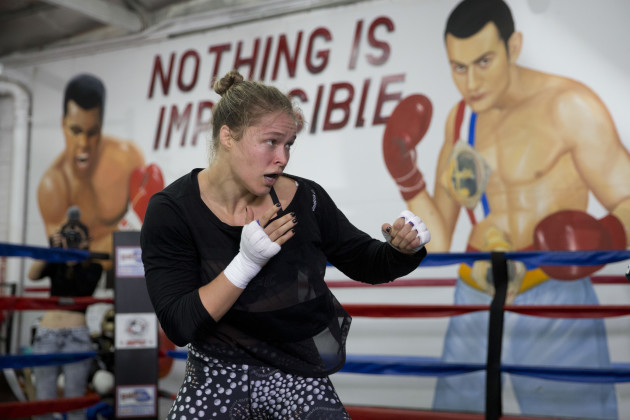THERE’S A CERTAIN sense of paradox in how we, as an audience, react to each of Ronda Rousey’s victories.
We’re certain that her next fight will be another flawless, commanding, blink-of-an-eye win, yet there’s still an element of shock when it unfolds.
Wow. She did it again.
Ronda Rousey is the UFC women’s bantamweight champion. Undefeated at 12-0, she’s the most dominant fighter and biggest star that the sport of mixed martial arts has ever seen.
After her most recent win, you began to wonder how long more she can keep doing what she’s doing. Rousey’s opponent, Bethe Correia, was disposed of in 34 seconds. If it’s any consolation, Bethe, you lasted longer than the champion’s previous two victims combined — Cat Zingano and Alexis Davis (14 and 16 seconds respectively).
Eleven of Rousey’s 12 professional fights have ended in the first round — eight of them in the first minute — and in her entire career to date, she has spent a total of 25 minutes and 16 seconds in the cage — just 16 seconds more than the duration of a championship fight.
It begs the question, what motivates such athletes to continue investing the maximum amount of time and effort into their preparation when they’re aware that they don’t need to be at their best in order to be the best? Over the years, the same could possibly be said of Usain Bolt and Floyd Mayweather, or closer to home, Katie Taylor and the Kilkenny hurlers.
And from the viewers’ perspective, when does that level of dominance cease to become alluring and worthy of our attention? Rousey’s fight against Holly Holm this weekend could break UFC pay-per-view and attendance records, so saturation point isn’t in danger of appearing on the horizon yet.
When Rousey and Holm take to the octagon in Melbourne just after 5am Irish time on Sunday morning, this writer will be watching live, in spite of the knowledge that the fight could be over by the time I’ve had a chance to take the first sip of my 12th cup of coffee.
My recent doubts over Rousey’s motivation to keep putting in the hours were put to bed after reading her autobiography, ‘My Fight/Your Fight’, which was released earlier this year. The book provides an intriguing insight into Rousey’s journey from a young judoka to an undefeated mixed martial arts world champion.
“Winning was conditioned in me early on,” Rousey explains. “When I was little, during judo tournaments, I would sit and play hand games with the kid I was about to fight. My mom would pull me away and say, ‘Sit there and think about winning. Stop messing around.’”
Rousey’s mother, Ann Maria de Mars, is a mathematics professor. Long before that, however, she was the first American to win a gold medal at the World Judo Championships. From there began Ronda’s path, not only to martial arts, but to winning.
“My sister Jennifer says we grew up in a family where exceptional was considered average. If you got a report card with all A’s and an A-minus, my mom would ask why you didn’t get all A’s. If I won a tournament, my mom would ask why I didn’t win by all ippons, judo’s version of a knockout. She never expected more from us than we were capable of but she never accepted less.”
But Ronda Rousey’s sporting life wasn’t always as straigthforward as her unblemished run in MMA might suggest. There’s a sense that her time in judo was characterised by regrets and shortcomings. She took silver at the World Championships in 2007 and bronze at the Olympics a year later — significant achievements, but anything less than gold was a symbol of failure.
Another reason for Rousey’s apparent pursuit of perfection is her mother’s insistence that in order for an athlete to truly earn their place at the top, they need to be the best in their field even on a bad day.
“She taught me that it is not enough to just be better than everyone else. You have to be so much better that no one can deny your superiority. You have to be able to win every match twice on your worst day.”
In judo, Ronda Rousey was defeated by opponents who she believed were inferior, so her status as the biggest favourite in UFC history is unlikely to impact her mindset. Past experience has taught her not to take her rivals lightly.
“The moment you stop viewing your opponent as a threat is the moment you leave yourself open to getting beat. You start thinking you don’t have to train as hard. You cut corners. You get comfortable. You get caught.
“When I was little, people didn’t take me seriously because I could hardly get a sentence out. When I competed in judo, I was discounted because I was the American and Americans suck at judo. When I got into MMA, people brushed me off, first as a girl, then as a one-trick pony who only had a single move.
“I have carried other people’s lack of confidence in me around for my entire life. Even when I am the 11-1 favourite, I feel like I’m the underdog. Every single second of every day I feel like I have something to prove. I have to prove myself every time I walk into a new gym, onto a new movie set, into a business meeting, and in every fight.
“There have always been people who have written me off. They’re not going away. I use that to motivate me. I’m driven to show them just how wrong they are.”
Actions speak louder than words, of course, but there’s enough substance to Rousey’s comments to enforce the belief that if she ever does emerge second-best from a contest — imagine that — complacency won’t be to blame. There won’t be temptation to skip a boxing session in favour of a meeting with an agent regarding a movie role, or to turn the usual six-week training camp into a four-week training camp.
Until just a few months before she was signed by the UFC late in 2012, Rousey worked as a cocktail waitress and still lived in a tiny studio in apartment in Los Angeles, which was so unpleasant that she sometimes chose to sleep in her ramshackle Honda Accord instead.
“On more than one occasion, sewage would come up out of the toilet and shower, and I’d come home from work to an apartment filled with shit. I didn’t think I could get any lower.”
So, what hope is there for Holly Holm this weekend? Like Rousey, the 34-year-old from Albuquerque moved to MMA having been successful in another code. A former world champion boxer, in her two UFC bouts to date, Holm displayed an extravagant stand-up game. And although she has some spectacular knockouts on her resumé, at the highest level her striking has so far been geared towards point-scoring over finishing.
And how willing will she be to throw those punches and kicks when each forward movement is an invitation for Rousey to shoot for a takedown which, if successful, is likely to end the contest within seconds?
Holm’s boxing experience has allowed her to develop a good understanding of controlling the distance, so while there’s logic to suggest that she can make this fight slightly longer than what Rousey has become accustomed to, the reasons why and how she can win aren’t forthcoming.
Ronda Rousey’s vast superiority over her opponents in the grappling stakes has pardoned her to focus predominantly on honing her striking skills and, under the stewardship of Edmond Tarverdyan at Glendale Fighting Club, that side of her game has improved significantly — as evidenced by the fact having won her first eight fights by submission, three of her last four victories have come via (T)KO.
When the hyperbole is stripped away — “MMA has never seen anything like her, she’s transcending her sport, inspiring a generation of young women etc.” — how good is Rousey? Has she merely capitalised on being a big fish in a small pond of mediocre opposition, or is she really just that brilliant?
The answer probably lies somewhere in the middle. In terms of her reputation, Rousey has been a victim of her own dominance, with her detractors always ready to argue that her achievements are diluted by the calibre of the competition.
Although women’s MMA may lack quantity, there should be no doubting the quality of fighters like Sara McMann, an Olympic silver medalist in wrestling, and Brazilian jiu-jitsu black belt Alexis Davis. They’re good, but as long as Ronda Rousey is around, not good enough.
This weekend, Ronda Rousey will pick up $5-to-10 million at UFC 193. She’s her sport’s biggest earner and one of the most talked-about athletes on the planet, with plenty of lucrative advertising and acting roles on the side. The 28-year-old has astutely embraced the commercial side of the game but her unprecedented success has been built, first and foremost, by her ability to perform in the octagon.
Memories of the hard times are still fresh enough in the memory to ensure that she remains driven to stay at the top. Rousey can probably afford to take her foot off the pedal, but in the knowledge that it could all come crashing down around her with one slip-up, it’s a risk not worth taking.
“I need that other person in there. I can’t fight by myself,” Rousey said earlier this week in the first episode of the UFC’s ‘Embedded’ series for UFC 193.
“I need them to be there and I appreciate that they’re there, but this person is trying to piggyback off of all of the work I’ve done my whole life. They’re trying to steal that from me. In that sense, I’m offended by their presence. I hate them for trying to hurt me; for trying to take away something that I care so much about.”
In ‘My Fight/Your Fight’, Rousey wrote: “One of the reasons I crave winning so much is that life is so uncertain, so volatile. When I win, there is that one little moment of time where I’m not worried about everything being taken away from me at any second.
“There have been so many times when what I thought was real totally got turned upside down, sending my whole world into free fall. The knowledge that everything good can be taken away at any second is what makes me work so hard.”
Good luck, Holly.
